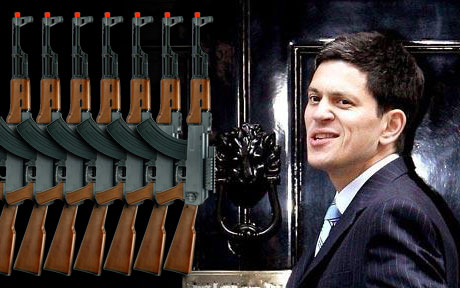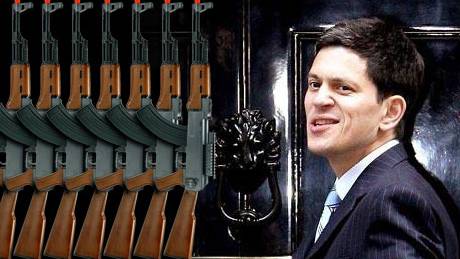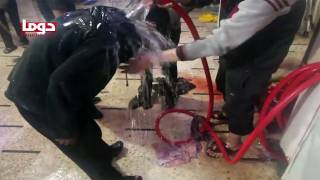Arms trade: UK dealers accused of selling Soviet weapons to blacklisted countries
Source: guardian.co.uk

Britain has launched an urgent investigation into allegations that UK arms dealers have been buying up old Soviet weapons and selling them on to blacklisted countries.
In a sign of acute government sensitivity over the allegations, the foreign secretary David Miliband has asked senior MPs on a Commons select committee to suppress evidence of the arms sales.
Miliband intervened after a group of MPs were handed a document detailing the arms sales by the deputy foreign minister in the former Soviet republic of Ukraine.
The cross-party group of MPs met Oleksandr Gorin during a visit to Kiev in May on behalf of the Commons select committee on arms export controls.
In their report, published today, the MPs write: "The document contained a list of UK registered brokers to whom the Ukrainian State Service for Export Control had licensed the export of collectors' items (light arms) from the Soviet stockpile of weapons. We were alarmed to see that the end users on the list included countries for which there are Foreign and Commonwealth Office restrictions on the export of strategic goods."
The MPs – the committee chairman Roger Berry, Labour backbencher David Borrow and the former Tory minister Sir John Stanley – alerted the Foreign Office about the alleged sale of weapons which are believed to include the notorious AK-47 Kalashnikov assault rifle.
Miliband wrote to the MPs to say that the Export Control Organisation and HM Revenue & Customs were examining the companies listed in the document.
The foreign secretary then asked the MPs not to publish the document handed to them by the Ukrainian government. "From our perspective it would be preferable if the [committee] did not at this point make public the details contained in the list as it would alert the companies to the fact that we are investigating and might lead those who have committed an offence to try to cover their tracks."
In their report today, the MPs express unease that the Foreign Office had no idea about the Ukrainian arms sales. They say there is evidence that some of the "massive stockpiles of ex-Soviet weapons" in Ukraine have ended up in "undesirable locations", citing a report in June that Ukrainian arms were intercepted in Nigeria on their way to Equatorial Guinea.
"We are extremely concerned that the UK embassy in Kiev, the Export Control Organisation and HM Revenue & Customs were all unaware of the existence of this list of UK brokers who had been granted export licences by the Ukraine State Service for Export Control, particularly as it was provided to us freely by the Ukrainians...
"We recommend that, in major arms exporting countries such as Ukraine, the FCO should ensure that its embassies and diplomatic posts engage more effectively with the national export control organisations to obtain information on UK arms brokers licensed by overseas states."
Borrow said that Ukraine did not present a nuclear threat because it voluntarily gave up Soviet nuclear weapons after the dissolution of the USSR in 1991. He added: "Obviously they did inherit large stocks of conventional weapons. We were all very surprised [by the document]. We tried to be as responsible as possible in the way in which we dealt with it."
The committee also calls for closer scrutiny of British arms exports after the government confirmed earlier this year that Israeli weapons used in the Gaza conflict almost certainly contained British-made components. The committee described this as regrettable.
Concerns were also raised that British military equipment, exported to Sri Lanka during the ceasefire between the government and the Tamil Tigers, may have been used against civilians when hostilities intensified in 2006.
Source: guardian.co.uk






















